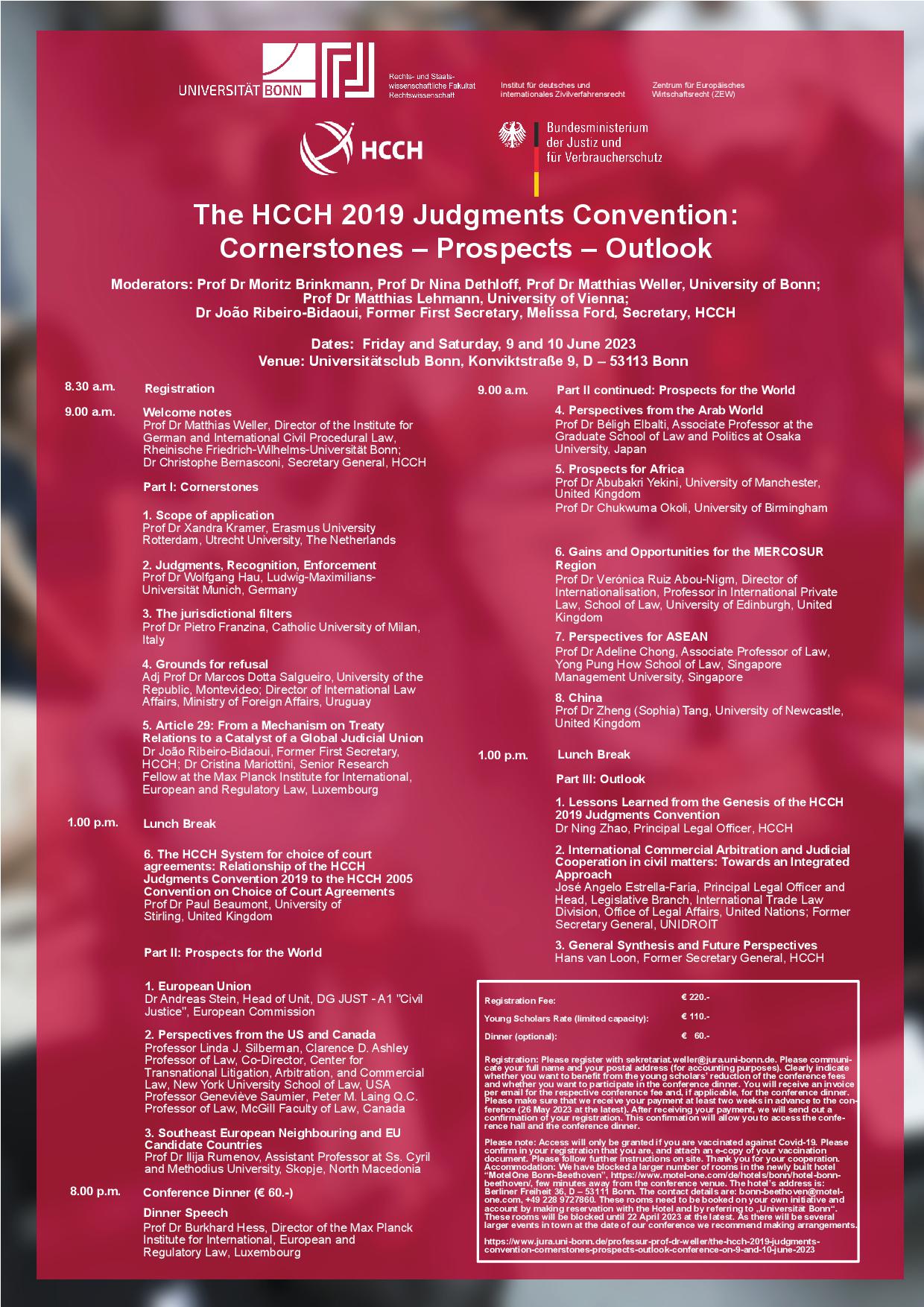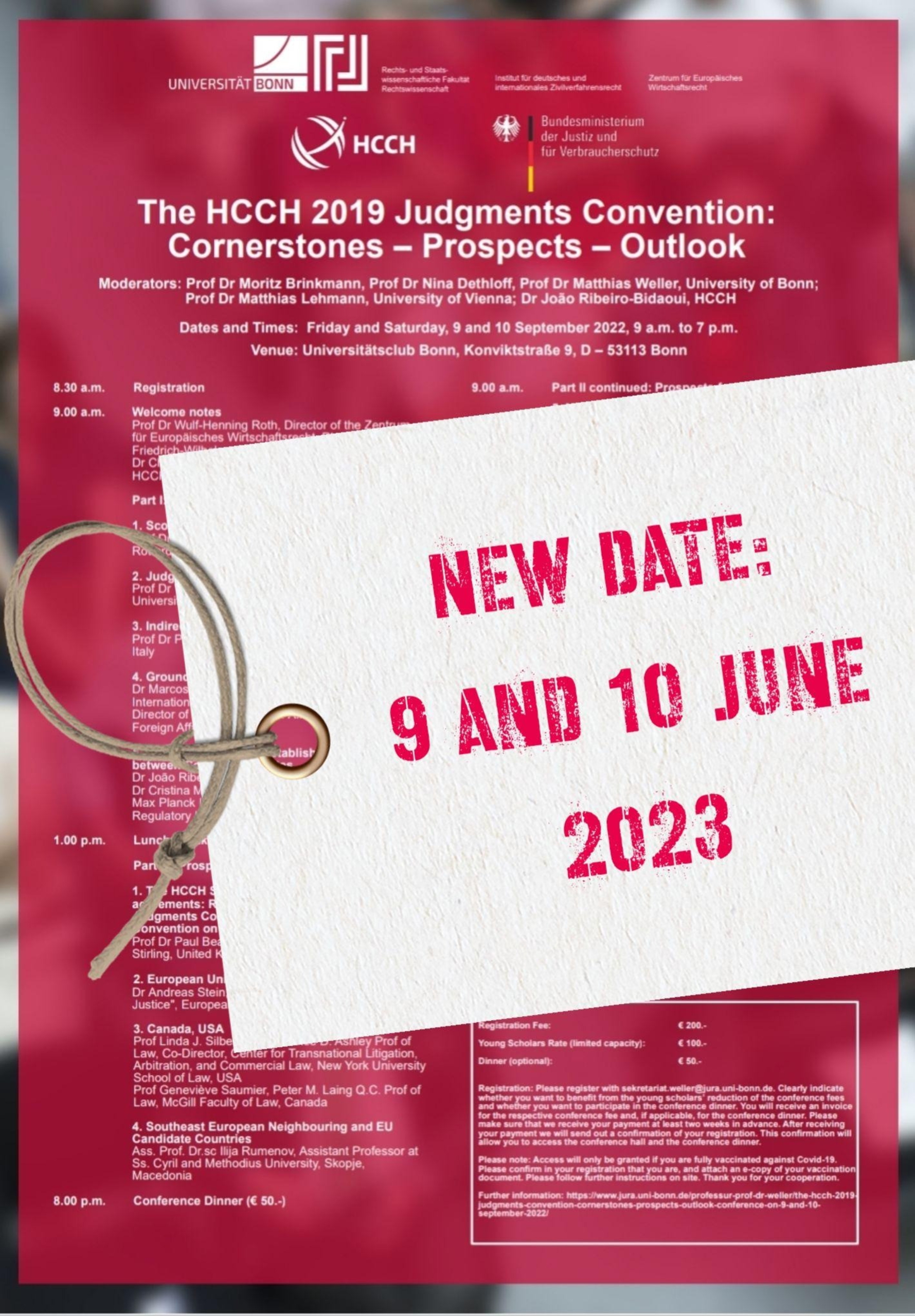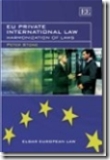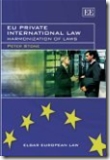Bonn University / HCCH Conference — The HCCH 2019 Judgments Convention: Cornerstones – Prospects – Outlook, 9 and 10 June 2023
Registration now open
Dates:
Friday and Saturday, 9 and 10 June 2023
Venue:
Universitätsclub Bonn, Konviktstraße 9, D – 53113 Bonn
Registration:
sekretariat.weller@jura.uni-bonn.de
| Registration Fee: | € 220.- |
| Young Scholars Rate (limited capacity): | € 110.- |
| Dinner (optional): | € 60.- |
Registration: Please register with sekretariat.weller@jura.uni-bonn.de. Please communicate your full name and your postal address (for accounting purposes). Clearly indicate whether you want to benefit from the young scholars’ reduction of the conference fees and whether you want to participate in the conference dinner. You will receive an invoice invoice per email for the respective conference fee and, if applicable, for the conference dinner. Please make sure that we receive your payment at least two weeks in advance to the conference (26 May 2023 at the latest). After receiving your payment we will send out a confirmation of your registration. This confirmation will allow you to access the conference hall and the conference dinner.
Please note: Access will only be granted if you are vaccinated against Covid-19. Please confirm in your registration that you are, and attach an e-copy of your vaccination document. Please follow further instructions on site, e.g. prepare for producing a current negative test, if required by University or State regulation at that moment. We will keep you updated. Thank you for your cooperation.
Accommodation: We have blocked a larger number of rooms in the newly built hotel “MotelOne Bonn-Beethoven”, https://www.motel-one.com/de/hotels/bonn/hotel-bonn-beethoven/, few minutes away from the conference venue. The hotel’s address is: Berliner Freiheit 36, D – 53111 Bonn. The contact details are: bonn-beethoven@motel-one.com, +49 228 9727860. These rooms need to be booked on your own initiative and account by making reservation with the Hotel and by referring to „Universität Bonn“. These rooms will be blocked until 22 April 2023 at the latest. As there will be several larger events in town at the date of our conference we recommend making arrangements for accommodation quickly.
Programme
Friday, 9 June 2023
8.30 a.m. Registration
9.00 a.m. Welcome notes
Prof Dr Matthias Weller, Director of the Institute for German and International Civil Procedural Law, Rheinische Friedrich-Wilhelms-Universität Bonn;
Dr Christophe Bernasconi, Secretary General, HCCH
Moderators: Prof Dr Moritz Brinkmann, Prof Dr Nina Dethloff, Prof Dr Matthias Weller, University of Bonn; Prof Dr Matthias Lehmann, University of Vienna; Dr João Ribeiro-Bidaoui, Former First Secretary, HCCH; Melissa Ford, Secretary, HCCH
Part I: Cornerstones
- Scope of application
Prof Dr Xandra Kramer, Erasmus University Rotterdam, Utrecht University, The Netherlands
- Judgments, Recognition, Enforcement
Prof Dr Wolfgang Hau, Ludwig-Maximilians-Universität Munich, Germany
- The jurisdictional filters
Prof Dr Pietro Franzina, Catholic University of Milan, Italy
- Grounds for refusal
Adj Prof Dr Marcos Dotta Salgueiro, University of the Republic, Montevideo; Director of International Law Affairs, Ministry of Foreign Affairs, Uruguay
- Article 29: From a Mechanism on Treaty Relations to a Catalyst of a Global Judicial Union
Dr João Ribeiro-Bidaoui, Former First Secretary, HCCH
Dr Cristina Mariottini, Senior Research Fellow at the Max Planck Institute for International, European and Regulatory Law, Luxembourg
1.00 p.m. Lunch Break
- The HCCH System for choice of court agreements: Relationship of the HCCH Judgments Convention 2019 to the HCCH 2005 Convention on Choice of Court Agreements
Prof Dr Paul Beaumont, University of Stirling, United Kingdom
Part II: Prospects for the World
- European Union
Dr Andreas Stein, Head of Unit, DG JUST – A1 “Civil Justice”, European Commission
- Perspectives from the US and Canada
Professor Linda J. Silberman, Clarence D. Ashley Professor of Law, Co-Director, Center for Transnational Litigation, Arbitration, and Commercial Law, New York University School of Law, USA
Professor Geneviève Saumier, Peter M. Laing Q.C. Professor of Law, McGill Faculty of Law, Canada
- Southeast European Neighbouring and EU Candidate Countries
Prof Dr Ilija Rumenov, Associate Professor at Ss. Cyril and Methodius University, Skopje, North Macedonia
8.00 p.m. Conference Dinner (€ 60.-)
Dinner Speech
Prof Dr Burkhard Hess, Director of the Max Planck Institute for International, European and Regulatory Law, Luxembourg
Saturday, 10 June 2023
9.00 a.m. Part II continued: Prospects for the World
- Perspectives from the Arab World
Prof Dr Béligh Elbalti, Associate Professor at the Graduate School of Law and Politics at Osaka University, Japan
- Prospects for Africa
Prof Dr Abubakri Yekini, University of Manchester, United Kingdom
Prof Dr Chukwuma Okoli, University of Birmingham, The Netherlands
- Gains and Opportunities for the MERCOSUR Region
Prof Dr Verónica Ruiz Abou-Nigm, Director of External Relations, Professor of Private International Law, University of Edinburgh, United Kingdom
- Perspectives for ASEAN
Prof Dr Adeline Chong, Associate Professor of Law, Yong Pung How School of Law, Singapore Management University, Singapore
- China
Prof Dr Zheng (Sophia) Tang, University of Newcastle, United Kingdom
1.00 p.m. Lunch Break
Part III: Outlook
- Lessons Learned from the Genesis of the HCCH 2019 Judgments Convention
Dr Ning Zhao, Principal Legal Officer, HCCH
- International Commercial Arbitration and Judicial Cooperation in civil matters: Towards an Integrated Approach
José Angelo Estrella-Faria, Principal Legal Officer and Head, Legislative Branch, International Trade Law Division, Office of Legal Affairs, United Nations; Former Secretary General, UNIDROIT
- General Synthesis and Future Perspectives
Hans van Loon, Former Secretary General, HCCH
Download poster as a PDF Document.


 Dear Friends and Colleagues,
Dear Friends and Colleagues,
 A most useful new research handbook in European Law is on the table – highly recommended! The publisher’s blurb reads:
A most useful new research handbook in European Law is on the table – highly recommended! The publisher’s blurb reads:
